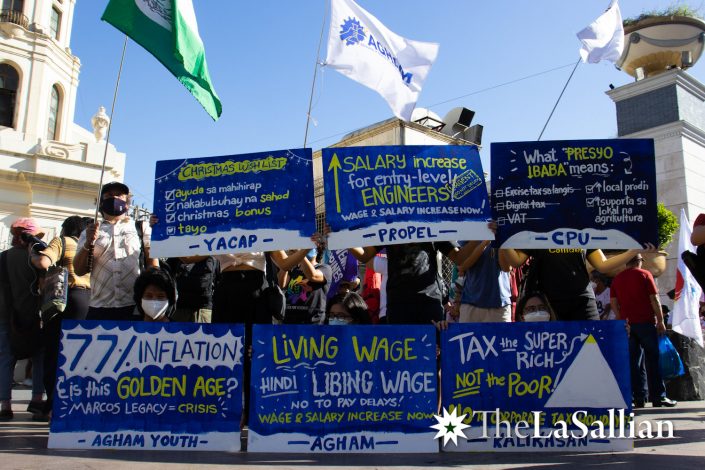Lasallians joined various progressive groups in Plaza Miranda last November 30 to commemorate the birth anniversary of hero Andres Bonifacio and Araw ng Masang Anakpawis. The movement—which grew in number upon reaching Liwasang Bonifacio—called for the increase in wages and lower commodity prices, along with calls to address other labor issues.

The protest—which Ground Commander PLt. Col. Ramon Nazario described as “very peaceful”—ended in Mendiola St. where various labor leaders aired the plight of the labor force amid higher costs of living in the country.
High prices, low income
“Unsustaining, insufficient for their families,” Anakbayan Chairperson Jeann Miranda described in Filipino the current minimum wage as the chant “sahod itaas, presyo ibaba” (higher wages, lower prices) resounded in the streets of Manila.
With the daily minimum wage set at P570 at most in the National Capital Region—the highest in the country—Kabataan Partylist Representative Raoul Manuel said that their goal is to pressure Malacañang to raise the minimum wage closer to IBON Foundation’s estimate of an ideal living wage, which is about P1,100 a day for a family of five.
The progressive groups also clamored for a national minimum wage, which former presidential runner and Bukluran ng Manggagawang Pilipino (BMP) Chairperson Leody de Guzman mentioned to be existent in the country until the time of former President Ferdinand Marcos Sr.
Meanwhile, prominent labor leaders present in the demonstration agreed that a government subsidy for struggling micro, small, and medium enterprises is needed to safeguard both the laborer and the enterprise.
Absent rights
For former senatorial aspirant and BMP President Atty. Luke Espiritu, labor rights in the country have been “invalidated” due to the practice of contractualization—a practice the groups have been fighting against as it goes contrary to one’s constitutional right to security of tenure.
Although others might argue that there are jobs that need to remain contractual such as seasonal jobs, Federation of Free Workers President Atty. Sonny Matula, who also ran for the Senate, argued otherwise. “Maski ‘yung seasonal, maaaring maging regular ‘yan ayon sa Korte Suprema. So seasonal ‘yung trabaho pero dapat kasi regular ‘yung arrangement, regular ang manggagawa diyan,” he commented.
(Even if you are a seasonal worker, you can be regularized according to the Supreme Court. So, the work is seasonal but your status is regular.)
Matula also mentioned that the two primary victims of contractualization are the unskilled worker and the fresh graduate.
Meanwhile, Matula believes that labor unions, which he mentions provide bargaining power to workers, are suffering as their numbers are dwindling.
“Unions are having trouble because the union density in the country is less than 10 percent of the labor force. This is why it is a challenge to form unions, which gives bargaining power to the worker. They should fight for it because it is their constitutional right,” Matula asserted in Filipino.
Increased youth involvement
DLSU student Francis Paul Fresnillo (Grade 12, HUMSS) said that he joined the protest to empower the rights of people who are at risk of losing their jobs, especially those who are working students. The National Network of Agrarian Reform Advocates-Youth (NNARA-Youth) shared the same sentiments and emphasized the importance of the youth’s involvement in nation building, with NNARA-Youth Spokesperson Melo Cabello noting that the youth are not spared from the social crises caused by the rising costs of goods.
“‘Yung problema na [kinakaharap] ng aming mga magulang, ng mga manggagawa, at ng mga magsasaka ay nararanasan din namin at nararamdaman,” he added.
(The problems faced by our parents, workers, and farmers are also experienced and felt by us.)
He further stressed that, in order to form a nationalistic workforce, there is a need for education reform that is geared toward national development. “Ang isinusulong natin na tipo ng edukasyon ay dapat nga hindi siya detached…nilalapit sila do’n sa foundation ng mga manggagawa; alam ng kabataan ‘yung hirap na [dinaranas] ng mga manggagawa para ngayon pa lang, alam na natin paano ‘yung isang favorable working condition.”
(We are advocating for a type of education that is not detached. We want one that is close to the foundation of our workers so the youth may know the difficulties of our workers and to be aware of what are favorable work conditions.)
